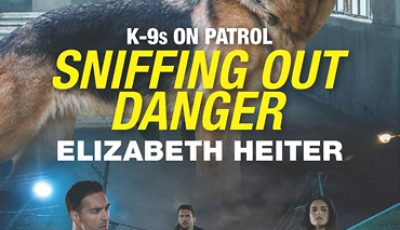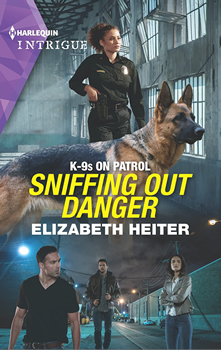

Sniffing Out Danger by Elizabeth Heiter
Elizabeth Heiter’s latest K-9 novel, SNIFFING OUT DANGER, is a well written, compelling, fast-paced story of love and redemption that engages the reader on the first page and keeps them entertained until the end.
We are immediately introduced to policewoman Ava Callan and her K-9 partner, Lacey. Ava is disgruntled at her current assignment and feels shortchanged given her level of experience at her previous job in Chicago. But she vows to do her best to adapt to the situation and take advantage of the new start she’s given herself.
While performing the wellness check she’s been tasked with, she makes a terrifying discovery. One thing leads to another, and explosives expert Eli Thorne, a police captain from another town, is called in to assist. His personality and comfort level with the community is the polar opposite of Ava’s, and he makes it his mission, as a coworker, to help her connect with the other officers and the townspeople she has chosen to serve. While the clock ticks down, Eli and Ava attempt to find a suspect and keep things from blowing up around them. But when romantic sparks start to fly between them, they must also work to keep their smoldering desire from igniting.
In this exclusive interview with The Big Thrill, Heiter lends insight to her new novel, SNIFFING OUT DANGER, her creative process, and her advice for aspiring and experienced novelists.
What was the inspiration for SNIFFING OUT DANGER?
SNIFFING OUT DANGER is my fifth book featuring a K-9 in a key role (after my 4 K-9 Alaska series books), and I’ve really enjoyed bringing K-9 characters to the forefront. This particular book is part of a “continuity” (a multi-author series where the publisher provides some of the connecting details of the storylines). So when I agreed to take part in the series, I already had some of the storyline. For me, inspiration came in finding ways to make the book fully my own, especially through the twists and turns of the mystery and in the unique details of my K-9 Lacey’s role.
Do you have a favorite adventure that occurred while conducting research?
Conducting research for my books is one of my favorite things to do. Although it wasn’t for this particular book, one of my favorite adventures was going to the FBI Academy at Quantico. Besides getting to talk to agents about real cases and procedures, I was able to walk through Hogan’s Alley (where agents-in-training practice things like arrests and managing hostage situations). I was also able to shoot all of the different weapons used by FBI agents, something that was so helpful for being able to accurately describe the action when my characters (often law enforcement) have to do it. During that same trip, I asked a weapons instructor whether most agents preferred to use a handcuff case or loop cuffs around their belt. He turned beet red and informed me that if you loop them around your belt loop, inevitably they will eventually fall in the toilet. A good reason never to get arrested.
Your character development was very effective. How do you construct the identities of the characters whose personal experiences are different than yours?
Thank you! I spend a lot of time trying to understand my characters. Every character is a unique combination of identities that I haven’t personally lived, so I like to figure out a lot of details about their background—everything from how and where they grew up to what scares them to what they want out of life. I also do research into particular aspects of characters’ identities that are different from my own experience, whether that’s their profession or where and how they’ve lived or their race or socioeconomic status. Every character comes from a combination of research and imagination, and it’s all heavily influenced by the details of their lives that I create for their backstory—some of which never directly appears on the page.
Lacey, the K-9 officer in SNIFFING OUT DANGER, had been trained to detect drugs but alerts her handler, Ava Callan, to a bomb. Is it easy for a K-9 that is trained for one thing to cross over to another area of expertise with limited training in the secondary skill?
Often, K-9s are trained for one specific task, but some K-9s can be dual-purpose. Lacey’s combination of training is unusual, but some K-9s can do both. I actually didn’t set out to give her training in multiple areas, but when I was developing the story, it didn’t feel realistic to me that a K-9 in such a small town would be trained just for bomb detection, because it wouldn’t be an in-demand skill there. But drug detection would have more uses. Still, my story involved a bomber, so I needed her to have bomb detection skills. When I read about dogs who trained to do both, I had an “aha” moment. Even though her training was more limited in bomb detection, she knew the basics of what to alert on and at that point, she’d had training specifically with Ava too. So it felt both realistic to the situation and to Lacey’s background, as well as a way to add some surprise to the opening scene.
When explosives expert, Eli, finds an intact “IED” bomb he knows what it is given his training with the FBI. Does the US military teach their service members to make this type of bomb? If so, why?
Although they’re not necessarily trained to make improvised explosive devices, soldiers are taught IED awareness skills in Basic Combat Training. Part of that training is to identify possible IEDs and know how to respond. That includes contacting specific units within the military that are trained to “render safe” IEDs. Anyone with training in disabling IEDs has extensive knowledge about how they work, how to locate them, and how to safely disable them.
I know your books involve “a mix of research,” and that you “like to start with online and book research.” In SNIFFING OUT DANGER, it feels like you went beyond this. Is it that easy to find information about how to make a bomb online? If not, how did you gain access to someone willing to discuss making a realistic bomb?
Online and book research tends to be my starting place because it gives me the basics. It helps me understand enough about my topic that when I talk to experts, I’m not wasting my time asking things I could find myself. When I talk to experts, I want to focus on the details that aren’t widely known, as well as the personal stories and emotions that take research beyond facts. As for making a bomb, you can find more than you should be able to online, but I have also spoken to law enforcement experts about the disarming process (which to me was really more of the focus than actually building the bomb). And with something like bomb making, my goal was to get the details right, but not be so specific that they could serve as a manual.
Given the number of novels you’ve produced, could you please tell readers what the secret is to avoid life intruding on your writing time?
I wish I had a secret! It’s a really tough balance, and some days are easier than others. But what I have found is that I need to prioritize my writing time and protect it the same way I would any other job. It can be easy for people around you (and yourself!) to assume that since you don’t technically have someone insisting you be clocked in at a desk from 9 to 5 that your work hours aren’t as important. But they are! I do try to write as close to every day as possible, and I use tracking software to understand how many words a day I need to write in order to meet deadlines (leaving time for editing at the end). I also try to use tactics to help me focus when I am writing so that I make the most of that time. For me, that means having a specific space to write, listening to music and re-reading what I wrote the previous day before I start. It’s not just the writing itself, either, but also time that has to be dedicated to marketing (ads, social media, website, interviews, newsletter, etc.). Blocking out that time for yourself every day means you’re constantly making progress.
If you could change anything in your writing journey to this point, what would it be and why?
There are things out of my control that I wish were different in the industry, but as for my writing journey, the parts that were challenging (such as taking many years to sell) have helped my perseverance and helped me grow as a writer. I do wish I’d realized earlier some of the things I could be doing on the promotion side for myself. I also wish I’d spaced out some of my deadlines more, so I could have more time to promote releases without having overlapping deadlines, as well as time to dedicate to stories that weren’t contracted alongside the ones that were. But I have always tried to stay true to what I wanted to write and what opportunities I wanted to pursue, which has helped me forge a path that feels like the right journey for me.
*****
Publishers Weekly bestselling author Elizabeth Heiter likes her suspense to feature strong heroines, chilling villains, psychological twists, and a little bit (or a lot!) of romance. Her research has taken her into the minds of serial killers, through murder investigations, and onto the FBI Academy’s shooting range. Her novels have been published in fifteen countries and translated into eight languages; they’ve also been shortlisted for the Daphne Du Maurier award, the National Readers’ Choice award and the Booksellers’ Best award and won the RT Reviewers’ Choice award and the HOLT Medallion.
To learn more about the author and her work, please visit her website.
- Dangerous Beauty by Melissa Koslin - September 30, 2022
- Sniffing Out Danger by Elizabeth Heiter - May 31, 2022
- Phoenix’s Ascent by Winter Austin - May 2, 2022


